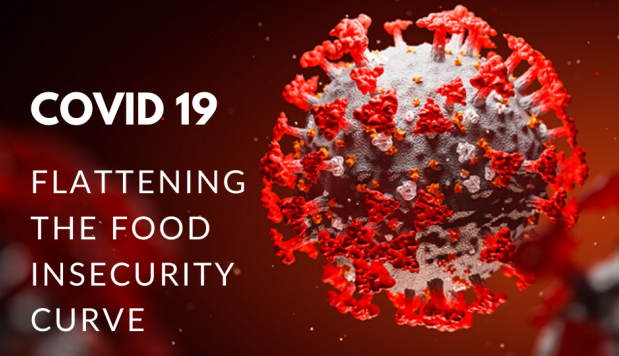To avoid societal collapses and their many potential ripple effects on world security, we must act now to flatten the food insecurity curve.
COVID-19: the domino effect
The COVID-19 pandemic is already affecting the world on an unprecedented scale. Yet, the unfolding health crisis is only the most visible part of the iceberg. The impending global recession coming in its wake will likely be the most challenging event mankind has faced in recent history. Given the considerable difficulties experienced by developed nations in their struggle to contain COVID-19 and manage its impacts, one can easily imagine the potential for catastrophic scenarios in the developing world, and most critically on the sustainability of its food systems.
Related topics: Bridging Divides Between Health and Food Systems – Locusts in East Africa – World Food Security
A risky dependence on food imports
Today, 80% of Africa’s agricultural production relies on smallholders. Their productivity is among the world’s lowest, capped at 30% of their potential due to lack of financing and market integration[1]. To feed their rapidly increasing populations, sub-Saharan African countries thus have to rely on massive food imports, projected before the onset of the pandemic to grow from USD 35 billion (2017) to USD 110 billion (2030) [2]. The COVID-19 crisis is already accelerating the prospect for a dramatic increase in Africa’s dependence on food imports for the following reasons:
- Assuming that national agricultural and agri-food industry workforces will be affected in proportions similar to those observed in the developed world, one can expect a brutal drop in Africa’s food production;
- Financial institutions have started contracting. Banks will increasingly turn towards less risky investments, significantly reducing agricultural lending, particularly to smallholder producers;
- The price of major food security commodities such as rice, wheat and maize will increase commensurate with spiking demand on world markets. This will severely constrain the financing of imports by countries that are already highly indebted.
Flatten the food insecurity curve
These extraordinary circumstances herald food crises of unique magnitude for the world’s most vulnerable nations, with direct implications on hunger, poverty, social unrest and stability. After the 2008 financial crisis, countries and financial systems adopted a reactive, demand-driven approach to provide the means to sustain the status quo, wages, purchasing power, etc. Such simple interventions cannot be afforded in the time of COVID-19, as the uncertainty grows as to where food will indeed be available at all. Ensuring the sustainability of supply itself will require marshalling a much more profound intervention on the world’s food systems.
The immediate emergency for appropriate curative and preventive solutions to COVID-19 should therefore not hide the concurrent imperative to prioritize and fast-track sustainable mitigation strategies to contain the massive emergent food insecurity brought about in vulnerable regions by the imminent global economic crisis. To avoid societal collapses and their many potential ripple effects on world security, we must act now to flatten the food insecurity curve in the same way flattening the COVID-19 infection curve will help preserve the integrity and function of national health systems.
Orchestrate food sovereignty
Food aid will obviously be critical to address symptoms of food insecurity, but not any more sufficient than ICU patient transfers to address symptoms of hospital saturation under COVID-19. We need a more transformative, orchestrated approach to food production, resulting in food systems that are both more integrative, more inclusive and hence more resilient. In Africa as elsewhere, COVID-19 presents us with the opportunity to accelerate agricultural transformation through orchestrated value chains that honourably promote (i) food sovereignty, traceability and quality and (ii) valuable participation on international markets, hence reducing trade balance deficits, improving food and nutritional security and reducing exposure to future shocks for individuals and entire societies alike.
The utmost priority is to immediately strengthen, in each target country, national support capacity for the next 2020 agricultural season with a triple trigger intervention that includes:
- A direct smallholders’ financing mechanism implemented through partner banks to (i) ensure accessibility and affordability of inputs to manage a minimum safety acreage allotment for food security purposes and (ii) provide technical backstopping to increase productivity by up to 60%;
- Simultaneously, direct support to agro-industries to enhance their capacity to absorb and transform the expected increase in smallholder throughput;
- Support to transactions between agricultural value chain stakeholders to help (i) aggregators and transformers purchase smallholders’ production and (ii) retailers purchase transformed food items for commercialization on the market.
[1] Only 11.32% of African smallholder producers have regular access to agricultural credit (source: Manobi Africa, 2019. Data from 15,850 smallholder farms of Ghana, Côte d’Ivoire, Nigeria and Senegal).
[2] Adesina A. 2017. Betting on Africa to feed the world. Norman Borlaug Lecture, World Food Day, Des Moines, IA, USA
[3] Given average production costs estimated at USD 600/ha in Africa (source: Manobi Africa, 2019)
About the author: Developed by Manobi Africa PLC with technical support from the International Crops Research Institute for the Semi-Arid Tropics (ICRISAT), the CGIAR Research Program on Climate Change, Agriculture, and Food Security (CCAFS) and the European Union’s Horizon 2020 research and innovation program, agCelerant is an advanced value chain orchestration and business development ecosystem connecting smallholders with credit, insurance, input and output markets. Learn more here.
EDITOR’S NOTE: The opinions expressed here by Impakter.com columnists are their own, not those of Impakter.com. Photo Credit: Pierre Sibiry Traoré (ICRISAT)












